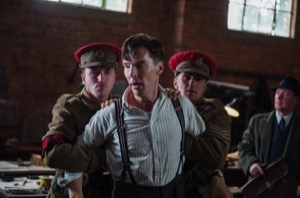
Let’s get this out of the way: Despite what you may have heard, read on Twitter, or seen ranted about on Facebook, The Imitation Game is a not a homophobic whitewash of Alan Turing, the gay British man who broke the Nazi codes during World War II and more or less invented the computer. Despite his key role in winning the war, Turing was arrested for his homosexuality and forced to undergo chemical castration to avoid prison; he killed himself after a year of horrible hormone therapy. When the first trailer for the film (which is hyped Oscar bait produced by the Weinstein Company) was posted online, it seemed as if the film would focus on the relationship between Turing and Joan Clarke, a fellow codebreaker to whom he was briefly engaged. And Turing’s biographer, Andrew Hodges, whose book the film is adapted from, complained about the script’s overemphasis on Clarke, as well as inaccuracies created for dramatic effect.
Few historians can stomach a Hollywood version of the history they know well, but as a gay man perhaps overly aware of homophobia in film, I found it very, very hard to complain about the film. Not only is the story framed by Turing’s arrest for homosexuality, but it is also thematically focused on the agony of keeping secrets and the injustice of a country he helped save destroying his life. The movie is the opposite of homophobic. And it’s quite good.
The film begins with a break-in a Turing’s house in 1952. The police come and he is dismissive, which makes them curious, and this curiosity leads to Turing’s arrest for homosexuality. The rest of the film is Turing telling a police officer about his secret life at Betchley Park, England’s top secret code-breaking facility during World War II. He was part of a team of mathematicians gathered to decipher the Nazi messages encoded by Enigma, an absurdly complicated and seemingly impossible to break encryption machine.
The awkward, humorless Turing is played by Benedict Cumberbatch, who is making a career playing strange, sometimes unlikable geniuses – Sherlock Holmes, Julian Assange, Khan. (A lovesick teen version of Turing in another set of flashbacks is played by Alex Lawther.) He drives his fellow codebreakers, particularly Hugh Alexander (Matthew Goode), crazy with his casual insults and his refusal to do anything besides work on a machine he claims will counter Enigma, a machine no one else thinks will ever work. Betchley’s Commander Denniston (Charles Dance) hates him more than anyone.
Nevertheless, Turing gains control over his team, much to their and Denniston’s consternation, and he fires two members and recruits more with a test masquerading as a newspaper puzzle contest. Joan Clarke (Keira Knightley) does the particularly hard puzzle faster than Turing can, and he invites her to Betchley. They become fast friends, because she is brilliant and because she believes in his work. When she says she must leave Betchley because her parents are angry that she’s 25 and unmarried and because they have no idea what she’s really doing, Turing asks her to marry him. She is clearly under no illusion that they’re romantically in tune.
Much of the film’s plot is focused on office friendships and petty politics, the rather turgid process of code breaking, reactions to Turing’s arrogance and off-kilter affect, and his mostly unspoken attraction to men. Screenwriter Graham Moore and director Morten Tyldum uses all of it to make us ponder the emotional cost of lying for good causes, sacrificing for a greater good and pursuing an abstract ambition over emotional contentment.
Cumberbatch and Knightley are both fantastic, though not as sublime as some awards prognosticators are claiming. Quirky, endearing, and compelling in their own odd ways, they make an adorable platonic couple.
MOVIE REVIEW
The Imitation Game
Directed by Morten Tyldum
Written by Graham Moore
Starring Benedict Cumberbatch, Keira Knightley, and Charles Dance
Rated PG-13
Opens Christmas Day at Landmark Hillcrest and La Jolla Village











